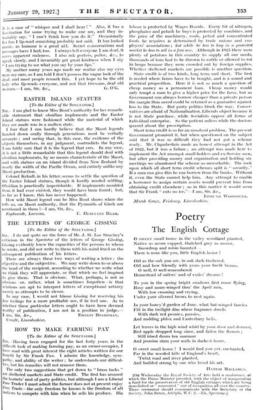HOW TO MAKE FARMING PAY
ITo the Editor of the SPECTATOR.]
S91,—Having been engaged for the last forty years in the difficult task of making fanning pay, as an owner-occupier, I have read with great interest the eight articles written for our benefit by Sir Fthnk Fox. I admire the knowledge, sym- pathy, and ability of the writer ; he understands our difficul- ties, but his remedies will not remove them.
The only two suggestions that get down to " brass tacks " are sheltered markets and State credit. The first has aroused the hornets' nest of party politics, but although I am a Liberal Free Trader I must admit the farmer does not at present enjoy Free Trade—the only freedom he knows is the freedom of all nations to.cothpite with him when he sells his produce. His labour is protected by Wages Boards. Every bit of nitrogen, phosphates and potash he buys is protected by combines, and the price of the machinery, coals, petrol and concentrated foods he requires is determined by trade unions and em- ployers' associations ; but while he has to buy in a protected market he has to sell in a free one. Although in 1925 there were plenty of potatoes in this country to supply all our needs, thousands of tons had to be thrown to cattle or allowed to rot in heaps because they were crowded out by foreign supplies. Whether sheltered markets are possible is another question.
State credit is of two kinds, long term and short. The first is needed where farms have to be bought, and is a sound and practical proposition. Here it is not so much a question of cheap money as a permanent loan. Cheap money would only tempt a man to give a higher price for the farm, but as Government can always borrow cheaper than a private person the margin thus saved could be retained as a guarantee against loss to the State. But party politics block the way. Conser- vatives are afraid of Nationalization, Liberals object because it is not State purchase, while Socialists oppose all forms of kalividual enterprise. So the patient suffers while the doctors quarrel about the prescription.
Short term credit is so far an unsolved problem.. The present Government promised it, but when questioned on the subject said that it was so difficult they had not got a scheme ready. Mr. chipnberlain made an honest attempt in the Act of 1922, but it was a failure ; an attempt was made here to implement the Act amongst small-holders and ex-Service men, but after providing money and organization and holding six meetings we abandoned the scheme as unworkable. The rock upon which all short term credit schemes split is " security." If a man can give this he can borrow from the banks. Without it, even the State cannot help him. Any attempt to enable a borrower to assign certain assets would prevent him from obtaining credit elsewhere ; so in this matter it would seem that Sir Frank " cuts no ice."—I am, Sir, &c.,






































 Previous page
Previous page